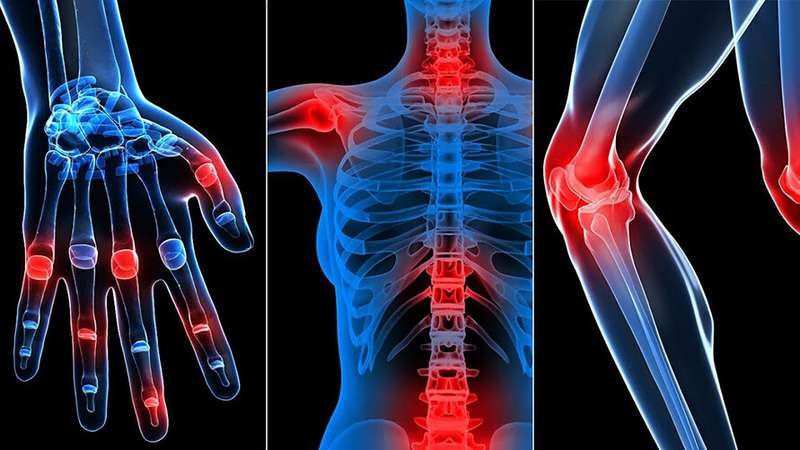Rheumatoid arthritis (RA)
Rheumatoid arthritis (RA) is a chronic autoimmune illness (ongoing). It differs from other types of arthritis in that it affects the joints on both sides of your body. If You experience any of the below discomfort and inflammation, contact the top orthopedic doctor in Hyderabad or search your locality for immediate medication. You may have symptoms in your:
- Fingers
- Hands
- Wrists
- Knees
- Ankles
- Feet
- Toes
Uncontrolled inflammation wreaks havoc on cartilage, which serves as a “shock absorber” in your joints. This can cause joint deformation over time. As a result, your bone will eventually deteriorate. This may result in the fusion of your joints (an effort of your body to protect itself from constant irritation).
This process is aided by specific cells in your immune system (your body’s infection-fighting system). These compounds are created in your joints but circulate throughout your body, causing symptoms. Rheumatoid arthritis can impact other parts of your body in addition to your joints, including your:
- Skin
- Eyes
- Mouth
- Lungs
- Heart
Initial symptoms of rheumatoid arthritis
Tenderness or soreness in minor joints, such as those in your fingers or toes, are early indicators of rheumatoid arthritis. You may also experience discomfort in a larger joint, such as your knee or shoulder. These early RA symptoms are similar to a vibrating alarm clock. Unfortunately, it might not have always been enough to pique your interest. However, early warning signals are critical since the sooner you are diagnosed with RA, the sooner you may begin treatment. In addition, brief therapy may reduce your chances of developing lasting, painful joint damage.
Examinations of the blood
Rheumatoid arthritis patients frequently exhibit elevated erythrocyte sedimentation rate (ESR, also known as sed rate) or C-reactive protein (CRP) levels, which can suggest an inflammatory process in the body. Therefore, two more popular blood tests are anti-cyclic citrullinated peptide (anti-CCP) antibodies and rheumatoid factor.
Imaging examinations
Your doctor may recommend X-rays to assist track the evolution of rheumatoid arthritis in your joints over time. In addition, MRI and ultrasound testing can help your doctor determine the severity of your ailment.
Treatment
Rheumatoid arthritis has no known cure. However, clinical trials show that remission of symptoms is more frequent when treatment with disease-modifying antirheumatic medicines starts early (DMARDs).
Medications
Your doctor will prescribe medications based on the severity of your symptoms and the length of time you’ve had rheumatoid arthritis.
- NSAIDs- Nonsteroidal anti-inflammatory medications (NSAIDs) can reduce inflammation and relieve discomfort. Ibuprofen (Advil, Motrin IB, and others) and naproxen sodium are examples of over-the-counter NSAIDs (Aleve). Prescription-only NSAIDs are available. Stomach upset, heart difficulties and renal damage are all possible side effects.
- Steroids- Prednisone and corticosteroid drugs relieve inflammation and pain while slowing joint deterioration. Side effects may include bone weakening, weight gain, and diabetes. Doctors frequently prescribe Corticosteroids to ease symptoms fast, intending to taper off the medicine progressively.
- Conventional DMARDs- These medications can reduce the progression of rheumatoid arthritis and prevent irreparable damage to joints and other tissues. Methotrexate (Trexall, Otrexup, and others), leflunomide (Arava), hydroxychloroquine (Plaquenil), and sulfasalazine are examples of common DMARDs (Azulfidine). However, side effects might range from liver damage to serious lung infections.
- Biological agents -This newest class of DMARDs, often known as biologic response modifiers, comprises abatacept (Orencia), adalimumab (Humira), anakinra (Kineret), certolizumab (Cimzia), etanercept (Enbrel), golimumab (Simponi), infliximab (Remicade), rituximab (Rituxan), sari (Actemra).
Biologic DMARDs are usually the most successful when used with a conventional DMARD, such as methotrexate. Unfortunately, this sort of medication also raises the risk of infection.
- Synthetic DMARDs- If conventional DMARDs and biologics have not been effective, baricitinib (Olumiant), tofacitinib (Xeljanz), and upadacitinib (Rinvoq) may be administered. Tofacitinib at higher doses may raise the risk of pulmonary blood clots, severe cardiac events, and cancer.
Therapy
Your doctor may urge you to see a physical or occupational therapist who may give you exercises to help keep your joints flexible. The therapist may also suggest new ways to perform daily duties that are less taxing on your joints. For example, you might want to take up an object with your forearms.
Assistive gadgets can help you prevent overstressing your sore joints. For example, a kitchen knife with a hand handle protects your finger and wrist joints. Specific equipment, such as buttonhooks, can make dressing easier. Catalogs and medical supply stores are excellent sources of inspiration.
Surgery
If drugs are ineffective in preventing or slowing joint damage, you and your doctor may consider surgery to restore damaged joints. Surgery may help you regain the use of your joint. It can also help with pain and function.
Surgery for rheumatoid arthritis may possibly require one or more of the following procedures:
- Synovectomy – Surgery to remove the inflammatory joint lining (synovium) can help relieve pain and improve joint flexibility.
- Tendon restoration – Tendons around your joint may loosen or tear due to inflammation and joint injury. Your surgeon may repair the tendons around your joint.
- Fusion of joints – When a joint replacement is not an option, surgically fusing a joint may be indicated to stabilize or straighten a joint and provide pain relief.
- Complete joint replacement – During joint replacement surgery, your surgeon will remove the damaged portions of your joint and replace them with a metal and plastic prosthesis.
The risks of surgery include bleeding, infection, and pain. Discuss the advantages and disadvantages with your doctor.
Final words
Rheumatoid arthritis might feel like a roller coaster of pain and tiredness. Tell your doctor about your experiences and symptoms by contacting the top orthopedic doctor in Hyderabad. Your quality of life will help guide treatment, X-rays, and blood testing. Your doctor will evaluate your symptoms and offer treatment.
